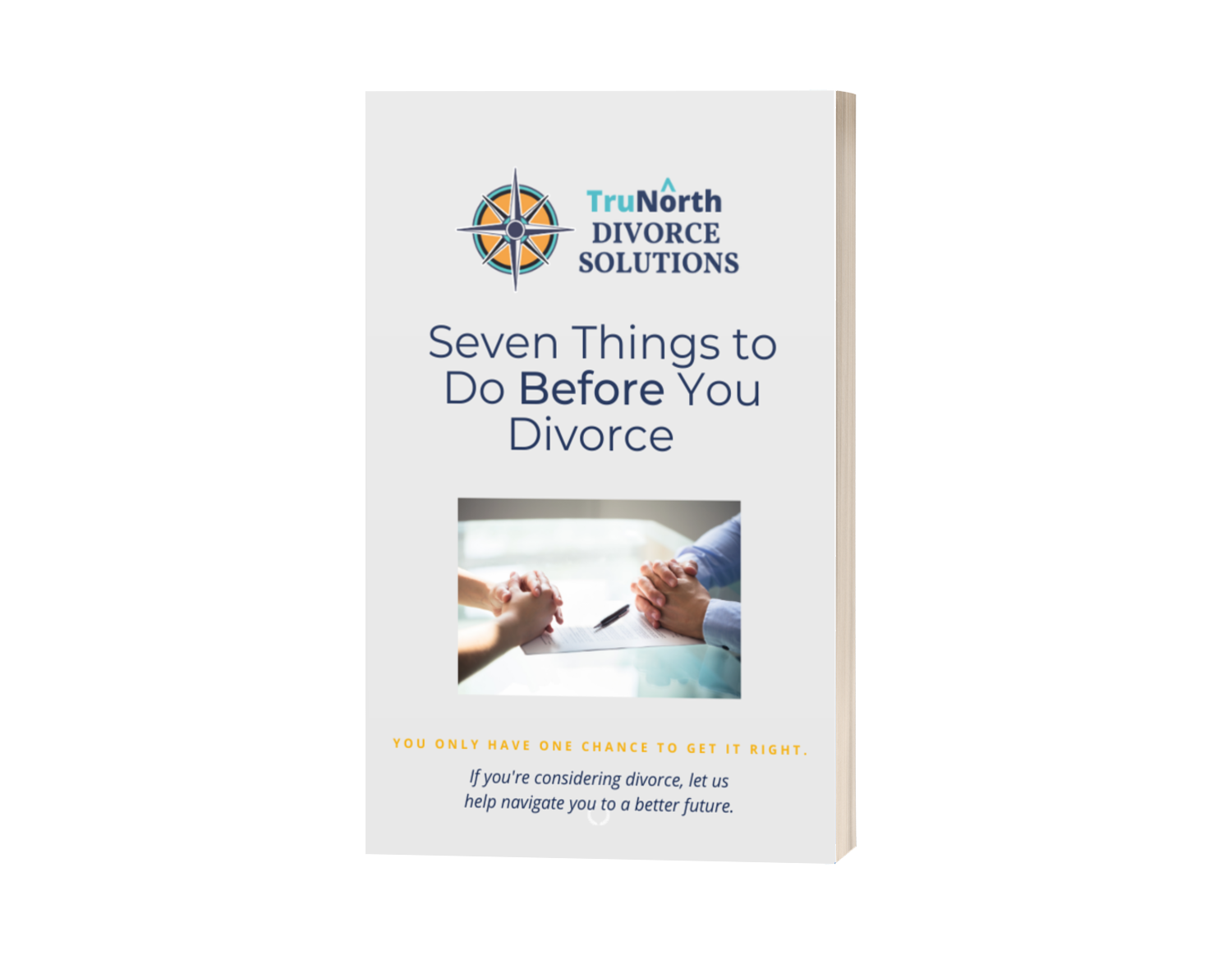SEVEN THINGS TO DO BEFORE YOU DIVORCE
Get Our FREE eBook!


Most “How to Get Divorced” articles focus narrowly on the legal mechanics of divorce in Florida—filing paperwork, court procedures, and timelines. These pieces are typically written by attorneys and, while helpful, they often overlook what ultimately drives outcomes in divorce: financial decisions.
In practice, divorce is rarely linear. It is a multi-layered process involving emotions, finances, children, property, taxes, and long-term planning. Legal steps matter, but they are only one part of a much larger puzzle. The choices made outside the courtroom often have the greatest impact on a person’s financial future.
With that in mind, this overview of divorce in Florida focuses on the three foundational components we believe are essential to navigating divorce thoughtfully and effectively.
Divorce is first and foremost a financial restructuring. Before filing—or even before formally raising the subject—it is critical to understand your financial landscape and protect your position.
Early preparation typically includes:
In Florida, which follows an equitable distribution framework, accurate financial records are essential. Missing or incomplete documentation can materially affect how assets, debts, and support are ultimately determined.
Many people assume that the first and most important professional in a divorce is a lawyer. Legal counsel is essential, but divorce outcomes are rarely optimized through legal analysis alone.
Financial decisions drive divorce outcomes. The legal process implements them.
A Certified Divorce Financial Analyst® (CDFA®) plays a critical role in helping individuals and couples understand:
Unlike attorneys, whose role is advocacy and legal procedure, a CDFA® focuses on analysis, modeling, and long-term financial clarity. This work often reveals settlement options that are more efficient, equitable, and durable—particularly in mediation or collaborative divorce.
Attorneys remain essential for:
Therapists and, in some cases, divorce coaches can provide emotional or practical support during the process. However, they are complementary—not central—roles. For most divorcing individuals, financial planning is the linchpin that connects legal decisions to real-world outcomes.
A basic understanding of Florida’s legal framework allows you to participate more effectively in decision-making and avoid unnecessary conflict or expense.
a. Legal Separation
Florida does not recognize legal separation. There is no formal legal status short of divorce.
That said, spouses may enter into binding agreements that address financial support, parenting arrangements, use of the marital home, and responsibility for debts—even before a divorce is finalized.
b. Residency Requirements
To file for divorce in Florida, at least one spouse must have lived in Florida for six months immediately prior to filing. Residency can be established through documentation or testimony.
c. Type of Divorce, Waiting Periods, and Filing
Florida is a no-fault divorce state. A divorce is granted when the marriage is deemed “irretrievably broken.”
There is no required separation period before filing. However:
Divorce cases are filed in circuit court in the county where either spouse resides. Local court rules and procedures vary.
d. Financial Settlements, Support, and Parenting Plans
If spouses cannot resolve financial or parenting issues by agreement, those matters will be decided by the court.
Litigation is expensive and often inefficient. Fully contested divorces commonly cost tens of thousands of dollars or more. Mediation and collaborative divorce, supported by strong financial analysis, frequently lead to better outcomes at a fraction of the cost.
Florida courts focus on:
When financial planning is integrated early, parties retain more control and are better positioned to reach informed, durable settlements.
Divorce in Florida is not just a legal event—it is a financial turning point. The most successful outcomes occur when legal strategy is informed by rigorous financial analysis and long-term planning.
Understanding your numbers, your options, and your future financial reality is not optional. It is foundational. If you would like help evaluating your financial position, modeling settlement scenarios, or integrating financial planning into your divorce strategy, we invite you to contact us or request a consultation.

If you’re considering divorce—or even if you’re simply preparing for the possibility—there is no better investment in your peace of mind than understanding your finances. Divorce is emotional, yes, but it is also a financial restructuring that can affect the rest of your life. Unfortunately, many people approach it the way they approach an emergency: reactive, rushed, and overwhelmed. By the time decisions are on the table, they’re already scrambling.
Pre-divorce financial planning flips the script. Instead of reacting, you’re preparing. Instead of hoping for “fair,” you’re working from data, projections, and financial facts.
Below are the core areas of planning that protect your future—not just during settlement discussions, but for the decades that follow.
Not all assets are created equal. A $200,000 retirement account does not equal a $200,000 home.
One is liquid, one is not. One has tax implications and penalties for withdrawal, and the other has maintenance, mortgage costs, property taxes, and liquidity constraints.
A Certified Divorce Financial Analyst® (CDFA®) looks beyond the sticker price.
People regularly leave tens of thousands of dollars on the table simply because they negotiated from asset totals—not from cash flow realities and future value. Divorce planning helps you see the full picture so you don’t trade away your retirement for something that looks “even” today.
The divorce process has a reputation for dragging on because both parties rarely come prepared.
When financial documents are missing or incomplete:
Financial prep eliminates these roadblocks.
A divorce financial professional gathers and organizes:
With this information clearly laid out, negotiations accelerate. Settlement conversations become factual, not emotional, and every stakeholder (mediator, attorney, collaborative team) has the data they need.
Divorce anxiety is deeply tied to financial fear:
These questions aren’t emotional—they’re mathematical.
Through financial projections, you can see:
Instead of panic, you’re planning. You’re not reacting—you’re making informed decisions that protect your future.
Many people don’t realize this hard truth:
The most expensive divorce isn’t the one with the highest attorney bill — it’s the one with the wrong settlement.
Every hour an attorney spends organizing documents or recalculating proposals is billable.
Financial preparation reduces those hours dramatically.
When the numbers are clear:
Investing in financial clarity at the beginning saves thousands later—often tens of thousands.
For couples or individuals with simpler finances who need clarity to negotiate.
You’ll receive:
Outcome:
Confidence in near-term decisions without overinvesting in analysis.
A complete financial roadmap — your MoneyMap™ for life after divorce.
You’ll receive:
Outcome:
Confidence in both immediate and long-term financial security.
Divorce affects every financial detail—assets, taxes, support, retirement, stability, legacy.
You deserve clarity over guesswork.
We are financial professionals, not attorneys.
Our goal is your best financial outcome.
You’ll see what’s possible, compare outcomes, and understand your options.
Walk into mediation or legal discussions knowing exactly what works—and what doesn’t.
We simplify the complex, protect your peace, and guide you with integrity and compassion.
Pre-divorce financial planning isn’t about winning—it’s about creating stability, fairness, and a future you can rely on.
If you want clarity before you begin, we’re here to help.
👉 Schedule a complimentary Clarity Session at trunorthdivorce.com

For many couples, the idea of a do-it-yourself divorce sounds like a relief.
No lawyers. No sky-high fees. Just a few forms, a notary, and a trip to the courthouse — right?
It’s no wonder DIY divorce has become so popular. When emotions are high and money is tight, “keeping it simple” feels like the only way forward.
But there’s a catch: divorce paperwork is only as good as what’s behind it.
If the financial details aren’t sound, or if key legal steps get missed, those “simple” decisions can create expensive, irreversible mistakes.
That’s why I always say — yes, you can do your own divorce. You just need to do it the right way.
A “DIY divorce” simply means handling your own process — completing and filing the paperwork, creating your settlement agreement, and managing the court filings — without hiring attorneys to do it all for you.
It can work well when:
But even in the simplest cases, it’s easy to overlook important financial details that have long-term consequences. Divorce isn’t just about paperwork — it’s about setting up two separate financial lives that still work.
Let’s be honest: most people don’t want a legal battle. They just want out — fairly and affordably.
The appeal of DIY divorce is real:
The problem? Without professional review, you might not even know what you’re missing until it’s too late.
Here are some of the biggest pitfalls I’ve seen over the years — and what they can cost.
1. The Missing QDRO
A couple agrees to split a retirement account 50/50 and puts it in their paperwork. But they never file the required Qualified Domestic Relations Order (QDRO).
Years later, when one spouse retires, the other gets… nothing.
Cost: $100,000+ in lost retirement income.
2. The House Headache
One spouse keeps the home “for stability.” No refinance, no appraisal, no tax review. Months later, they can’t afford the mortgage and learn they can’t qualify for refinancing — or claim the capital gains exemption later.
Cost: tens of thousands in taxes and credit damage.
3. The Tax Time Surprise
A “simple” agreement leaves one parent unable to claim dependents or deductions. Come April, they owe thousands more than expected.
Cost: $10,000 in lost tax savings — and a lot of stress.
Each of these started as a DIY divorce that seemed fine — until the details caught up.
That’s where DIY Divorce Done Right™ by TruNorth comes in.
It’s designed for couples who want a low-cost, no-lawyer divorce option — without costly mistakes.
Instead of navigating confusing legal forms and hoping everything holds up, you get:
This isn’t just “DIY paperwork.” It’s DIY with professional backup.
DIY Divorce Done Right™ is ideal for couples who:
Even if your situation is a bit more complex, starting with a guided DIY process can help you clarify your goals — and upgrade to full service if needed.
Once a divorce is finalized, it’s incredibly hard to undo financial mistakes. Courts rarely reopen settled cases, even if you later realize something was missed.
That’s why an affordable review by a divorce financial professional can make all the difference. It’s the safeguard that lets you move forward confidently, knowing your agreement truly supports your future — not just your present.
A DIY divorce can absolutely work — if you do it the right way.
With DIY Divorce Done Right™ by TruNorth, you can:
Because when you’re ending a marriage, the last thing you need is a costly surprise.
Do it yourself — with the clarity, guidance, and peace of mind you deserve.
Learn more about DIY Divorce Done Right™ by TruNorth
The low-cost, no-lawyer divorce option that keeps you protected.

One of the most common questions during divorce is: “Will an inheritance remain mine?”
The answer depends on how the inheritance was managed during the marriage. While inheritances are generally considered separate property, certain actions can cause them to be reclassified as marital property and subject to division. Understanding how the law views inheritances, and the mistakes that can put them at risk, is critical to protecting long-term financial stability.
Divorce law typically categorizes assets into two groups:
Although inheritances begin as separate property, they can lose that status depending on how they are treated during the marriage.
An inheritance is more likely to remain protected in divorce if:
For example, keeping inherited funds in a separate account with a clear record of origin helps strengthen the case for the inheritance to remain outside the marital estate.
Inheritances may lose their separate status if they are mixed, or “commingled,” with marital assets. Courts may reclassify inheritances as marital property if:
These actions often occur with good intentions, but they can significantly affect how inheritances are treated in divorce.
Certain decisions frequently lead to the loss of an inheritance’s separate classification, including:
Each of these actions can transform a separate inheritance into marital property, subjecting it to division.
Steps that can help safeguard an inheritance include:
Being intentional from the start provides the best chance of keeping an inheritance separate in divorce.
The difference between preserving an inheritance and losing part of it often depends on small details—such as documentation, account structure, and financial decisions made years earlier. Tracing funds and analyzing how they have been used is often necessary to determine whether an inheritance is separate or marital property. Professional guidance can help avoid costly mistakes and ensure that assets are classified correctly.
Inheritances are not automatically protected in divorce. While they begin as separate property, choices such as depositing funds into joint accounts or retitling property can put them at risk. Keeping inheritances separate, maintaining detailed records, and consulting professionals are essential steps for safeguarding these assets.
At TruNorth Divorce Solutions, clients receive guidance on navigating complex financial issues in divorce, including the treatment of inheritances. Those with questions about how an inheritance—or any other asset—may be classified are encouraged to book a complimentary consultation to gain clarity and protect their financial future.
It’s no secret that over 50% of marriages end in divorce, even more if you’re in your 2nd or 3rd marriage. Whether this is a good thing or a bad thing depends on your perspective. I’m a believer that life is short and everyone is entitled to their happiness. My guess is that if you’re not happy in your marriage, your spouse isn’t either.
If you’re thinking about ending your marriage there a few steps you need to take before you initiate your divorce. These will help to ensure the best outcome for you should you decide to move forward. This is not a decision to be taken lightly and a little preparation can go a long way. The reality is that you now have to stop thinking emotionally and start thinking financially.
Divorce may be the toughest this you’ll ever do. Believe me, I know. Right now all you may be thinking about is how miserable you are and that you have to get out. Before you pull the plug though, take a deep breath. Then start planning so that you (and your children) have the best foundation for a happier future.
Start by assessing your current lifestyle and what you’d be able to afford on your own. What’s your current budget and spending? How much will it cost you to live on your own? How much more will you need to get by? Will this come from child support, alimony, a new job? If child support or alimony, best get some help figuring out how much that will be. If you need a new job, will that require more schooling or training? Do you want to keep the marital home? If so, can you refinance it in order to keep it? Can you really afford it? Too often this is an overly emotional decision. Will the kids really be happier in their current house if you’re struggling to pay the mortgage and utility bills?
Finally, what do you want your life to look like in five, ten, twenty years? What other situations in your life have you encountered where you had to call on your best qualities to succeed? Which qualities will you need now to get you where you want to go? How will you define a “successful divorce”? How will you take care of yourself physically, mentally, and spiritually over the next difficult months to ensure that success?
Now that you’ve taken stock and assessed what you’ll need. What kind of support will you need? A good therapist for emotional strength? A Certified Divorce Financial Analyst (CDFA®) or a CDFA®-Mediator to help you plan financially and for what a realistic settlement will look like? A divorce coach to help with all the decisions you’ll need to make along the way? A lawyer if you think litigation is inevitable?
A piece of advice, your first phone call should not be a lawyer! Assess your alternatives and ask for support where applicable but don’t assume you’ll need a lawyer for your divorce.
You will need to prepare for divorce and set some things up financially before your spouse is aware that you want a divorce or has reason to make life difficult for you. Start by opening your own checking and savings accounts and make sure there’s enough in them to get you by for two or three months. Get your credit report and start monitoring it periodically. Apply for a credit card or two in your own name. Last, consider you will, as well as beneficiaries on investment accounts and insurance policies. You should make appropriate chances in case something happens to you.
The divorce process can be scary and overwhelming. Starting with a plan and professionals that you trust to guide you through the process can be key in making sure you’re ready for you future. If you’re thinking about divorce schedule your complimentary divorce strategy session where we’ll explore your options and connect you with any resources you might need.